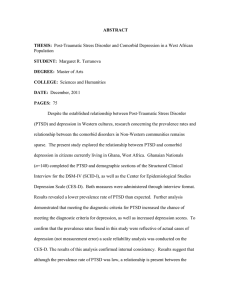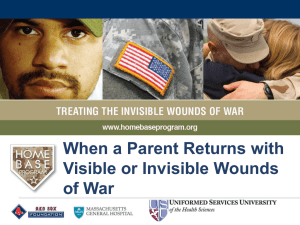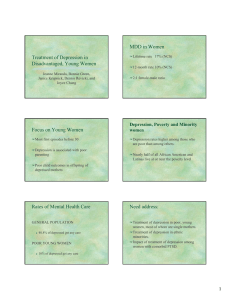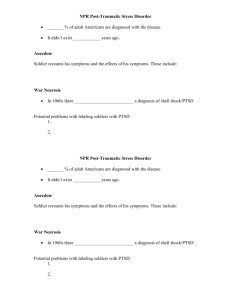SUPPORTING READINESS P Ensuring Excellent PTSD and Depression Care for Service Members
advertisement
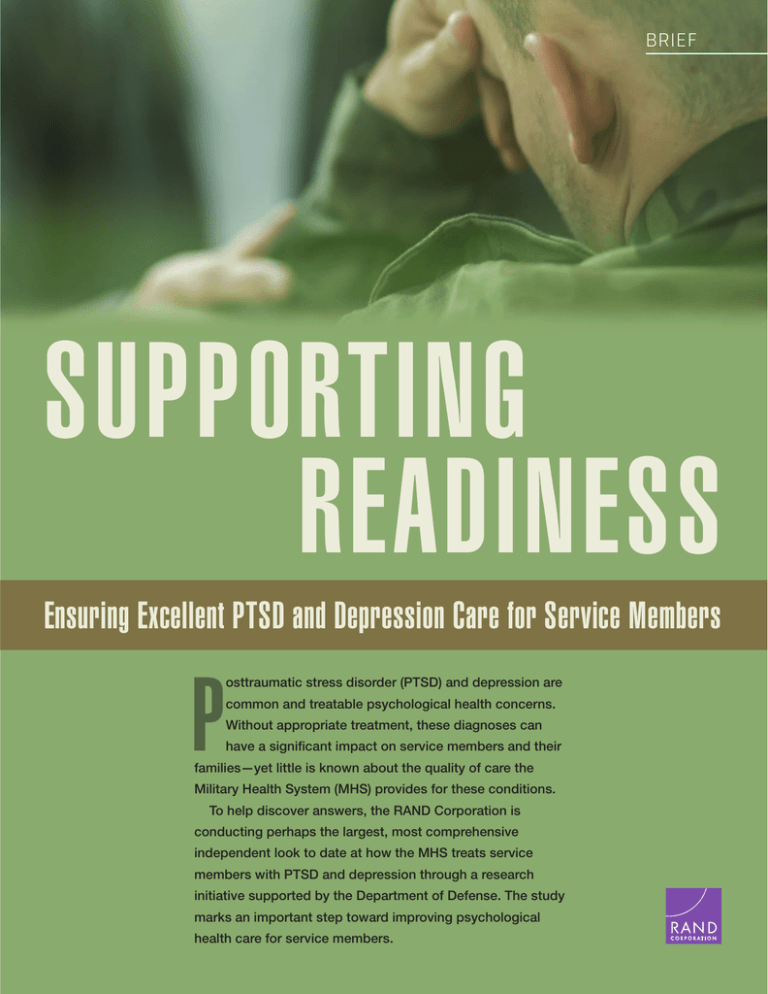
BRIEF SUPPORTING READINESS Ensuring Excellent PTSD and Depression Care for Service Members P osttraumatic stress disorder (PTSD) and depression are common and treatable psychological health concerns. Without appropriate treatment, these diagnoses can have a significant impact on service members and their families—yet little is known about the quality of care the Military Health System (MHS) provides for these conditions. To help discover answers, the RAND Corporation is conducting perhaps the largest, most comprehensive independent look to date at how the MHS treats service members with PTSD and depression through a research initiative supported by the Department of Defense. The study marks an important step toward improving psychological health care for service members. C O R P O R AT I O N Service members with PTSD or depression need excellent care to meet their complex needs The MHS shows areas of excellence . . . Service members with PTSD or depression receive an abundance of medical care. The median number of outpatient visits for any reason is 41 per year for PTSD patients, and 86% 30 visits per year for depression patients. Service members with PTSD or depression are seen by many different providers; the median number of unique providers during the study year was 14 for patients with PTSD, and 12 for those with of patients with PTSD or depression received an outpatient visit within seven days of discharge from a psychiatric hospitalization. depression. These service members frequently had other psychological health concerns, such as sleep and anxiety disorders. Five out of six service members received at least one psychotropic medication, and 45 percent of patients with PTSD and 31 percent of patients with depression received four or more medications. Excellent care is appropriate, timely, and coordinated. Given this combination of care utilization, number of different providers, and co-occurring diagnoses, 91% ensuring coordination of care for these service members is extremely important. The MHS shows important strengths, but improvements in care for PTSD and depression are needed of patients with PTSD and 82% of patients with depression received at least one psychotherapy visit. RAND results suggest that the MHS is a leader in providing timely outpatient follow-up after a psychiatric hospitalization. Eighty-six percent of patients with PTSD or depression received an outpatient visit within seven days of discharge. The period after a patient is discharged can be a vulnerable time, and such follow-up visits are critically important for these patients. Further, the vast majority . . . and areas needing improvement. of patients with a diagnosis received at least one psychotherapy visit—about 91 percent for those with PTSD and 82 percent for those with depression. This suggests that military patients who receive a diagnosis of PTSD or depression have access to at least some psychological health care. But there are also areas where improvement is needed. Although most patients Only 34% received at least one psychotherapy visit, the number and timing of visits may be inadequate to allow delivery of evidence-based psychotherapy. For example, patients newly diagnosed with either PTSD or depression should receive at least four psychotherapy or two medication management visits in the eight weeks following their diagnosis. Yet only one-third (34%) of patients newly diagnosed with PTSD and under a quarter of those with depression (24%) met this threshold. Further, only 45% of of patients newly diagnosed with PTSD received minimally appropriate care in the 8 weeks following their diagnosis (at least four psychotherapy visits or two medication management visits). Only 24% of those with depression met this threshold. patients with PTSD and 42% with depression received a follow-up visit within 30 days of starting a new medication treatment. Patients need timely medication Only 45% follow-up visits to adjust treatment, and these visits are particularly important when patients receive multiple medications. of patients with PTSD and only 42% with depression received a follow-up visit within 30 days of starting a new medication treatment. RAND’s Approach We are fortunate to be part of a system that celebrates its successes, and also directly confronts those areas that need greater attention. The study reviewed Military Health System administrative health care data for 14,576 active-duty service members who had a diagnosis of PTSD and 30,541 who had a diagnosis of depression in the first six months of 2012. RAND followed their care for a year after their diagnosis to assess whether those service members were receiving evidence-based care and whether there were any disparities in care quality by —JONATHAN WOODSON, MD, Assistant Secretary of Defense for Health Affairs in a January 5th, 2016, memo on The Military Health System as a High Reliability Organization branch of service, geographic region, or service member characteristics. Service members rs with PTSD or depression receive ive considerable medical care, so providing excellent care e is critical. 41 30 visits per year visits per year median number of outpatient visits for any reason for PTSD patients median number of outpatient visits for any reason for depression patients 5 of 6 received psychotropic medication Quality of care for PTSD and depression varies by service branch, region, and service member demographics However, no branch or region consistently outperformed or underperformed relative to the others. We also found no consistent patterns of variation in the quality of care by patient characteristics (age, gender, pay grade, race/ethnicity, or deployment history). Nonetheless, these variations indicate that the MHS can improve by providing excellent care consistently. 14 12 unique providers unique providers median number of unique providers per patient with PTSD median number of unique providers per patient with depression We owe it to service members to ensure that they receive excellent mental health care regardless of where they serve, where they live, or who they are. The Department of Defense has shown leadership in supporting such a comprehensive assessment of care for PTSD and depression. Transparent assessments of care delivered are essential to ensuring excellent care for all service members and their families. —KIMBERLY A. HEPNER, PhD, lead author, senior behavioral scientist and licensed clinical psychologist THIS BRIEF describes work done in the RAND National Defense Research Institute and documented in Quality of Care for PTSD and Depression in the Military Health System: Phase 1 Report, by Kimberly A. Hepner, Elizabeth M. The DoD is positioned to be a leader in providing high-quality, evidence-based care for PTSD and depression. Sloss, Carol P. Roth, Heather Krull, Susan M. Paddock, Shaela Moen, Martha J. Timmer, and Harold Alan Pincus, RR-978-OSD (available at www.rand.org/t/RR978), 2016. To view this brief online, visit www.rand.org/t/RB9876. The RAND Corporation is a research organization that develops solutions to public Recommendations RAND recommends the DoD take the following steps to implement strategies that improve the quality of care for psychological health conditions delivered by the Military Health System. policy challenges to help make communities throughout the world safer and more secure, healthier and more prosperous. RAND is nonprofit, nonpartisan, and committed to the public interest. RAND’s publications do not necessarily reflect the opinions of its research clients and sponsors. R® is a registered trademark. 1 Establish an enterprise-wide system that includes high-priority quality measures to assess care for psychological health conditions. A separate system for psychological health is not required; psychological health quality measurement could be integrated into Limited Print and Electronic an enterprise-wide system that assesses care across Distribution Rights: This document medical and psychiatric conditions. and trademark(s) contained intellectual property is provided 2 for noncommercial use only. Increase transparency—which provides key Unauthorized posting of this information to guide improving care—by reporting the herein are protected by law. This representation of RAND publication online is prohibited. Permission is given to duplicate this document for personal use only, as long as it is unaltered and results of quality measures for PTSD, depression, and psychological health both internally and publicly. The MHS has recently increased public reporting of quality complete. Permission is required measure rates (www.health.mil and www.tricare.mil), from RAND to reproduce, or reuse yet currently only two measures are related to in another form, any of our research psychological health (outpatient follow-up after documents for commercial use. For psychiatric hospitalization within seven and 30 days information on reprint and linking after discharge). permissions, please visit www.rand. 3 org/pubs/permissions.html. © RAND 2016 www.rand.org All photos and images are from Fotolia except for the two photos at the bottom of page 3, which are from Defense Video and Imagery Distribution System (image at left) and the U.S. Department of Defense (image at right). RB-9876-OSD (2016) Investigate the reasons for variations in care for PTSD and depression. Understanding what factors lead to higher and lower performance can guide quality improvement initiatives. For example, specific policies or practices adopted by a single service branch may prove useful to adopt enterprise-wide.
